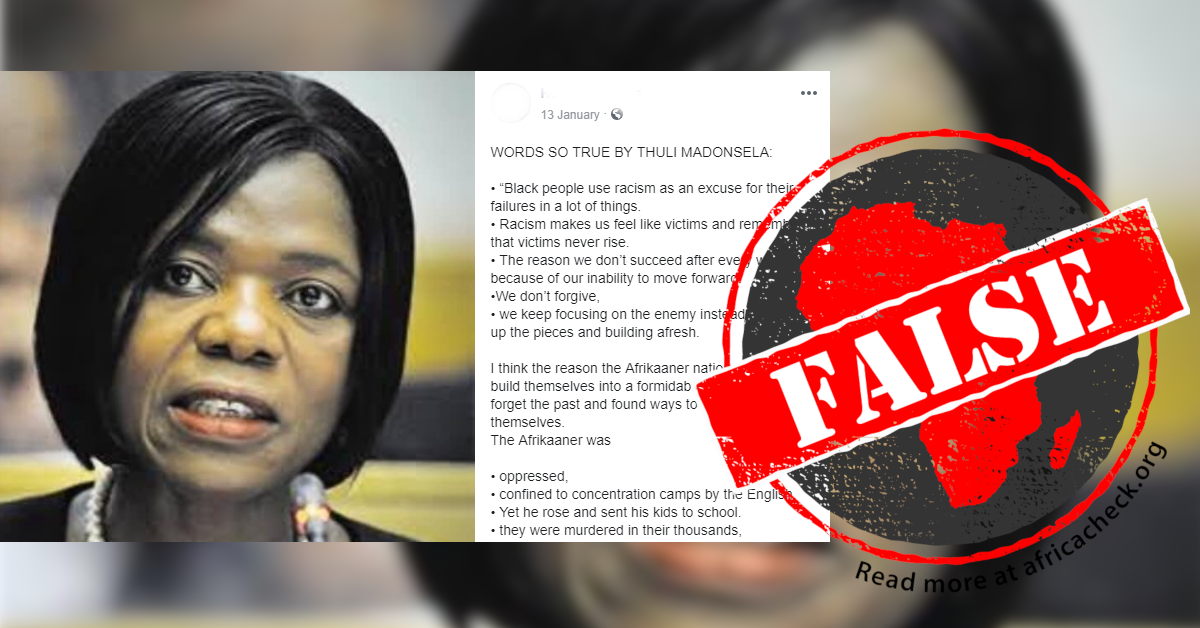A lengthy Facebook post about how black people “use racism as an excuse for their failures” has been attributed to South Africa’s former public protector, Thuli Madonsela.
It was posted on Facebook in January 2019 and has racked up over 38,000 shares so far.
Africa Check previously rated as false the claim that Madonsela had said she was “tired of black people in ANC blaming apartheid”. The African National Congress is South Africa’s ruling party.
The post on racism is also false.

Different versions of the post have been doing the rounds on Facebook for some time. AFP Fact Check found one version has been online since February 2018.
The post, headed “WORDS SO TRUE BY THULI MADONSELA”, claims black people use racism as an excuse for their failures and this inability to move forward is what holds them back.
This is unlike “the Afrikaner nation”, which was built by forgetting the past and finding ways to empower itself.
The post then attributes its comments to “Thuli Madonsela (Facebook 23 Jan 2018)”. But Madonsela told Africa Check she didn’t have a Facebook profile. And she is aware of fake accounts impersonating her.
In 5 January 2019 Madonsela urged her Twitter followers to ignore posts by imposter accounts. On the same day she shared an editorial she had written as an example of her “authentic views on race and racism”.
The opinion piece contradicts the views in the Facebook post. Rather than criticising black people for their inability to move on, Madonsela questions whether South Africa has truly transcended the legacy of its unjust past.
With no evidence to support it, we rate the Facebook post as false. - Africa Check (06/06/19)
It was posted on Facebook in January 2019 and has racked up over 38,000 shares so far.
Africa Check previously rated as false the claim that Madonsela had said she was “tired of black people in ANC blaming apartheid”. The African National Congress is South Africa’s ruling party.
The post on racism is also false.

Fake accounts impersonating Madonsela
Different versions of the post have been doing the rounds on Facebook for some time. AFP Fact Check found one version has been online since February 2018.
The post, headed “WORDS SO TRUE BY THULI MADONSELA”, claims black people use racism as an excuse for their failures and this inability to move forward is what holds them back.
This is unlike “the Afrikaner nation”, which was built by forgetting the past and finding ways to empower itself.
The post then attributes its comments to “Thuli Madonsela (Facebook 23 Jan 2018)”. But Madonsela told Africa Check she didn’t have a Facebook profile. And she is aware of fake accounts impersonating her.
‘Remnants of previously legalised injustices’
In 5 January 2019 Madonsela urged her Twitter followers to ignore posts by imposter accounts. On the same day she shared an editorial she had written as an example of her “authentic views on race and racism”.
The opinion piece contradicts the views in the Facebook post. Rather than criticising black people for their inability to move on, Madonsela questions whether South Africa has truly transcended the legacy of its unjust past.
With no evidence to support it, we rate the Facebook post as false. - Africa Check (06/06/19)
Republish our content for free
For publishers: what to do if your post is rated false
A fact-checker has rated your Facebook or Instagram post as “false”, “altered”, “partly false” or “missing context”. This could have serious consequences. What do you do?
Click on our guide for the steps you should follow.
Publishers guideAfrica Check teams up with Facebook
Africa Check is a partner in Meta's third-party fact-checking programme to help stop the spread of false information on social media.
The content we rate as “false” will be downgraded on Facebook and Instagram. This means fewer people will see it.
You can also help identify false information on Facebook. This guide explains how.



Add new comment